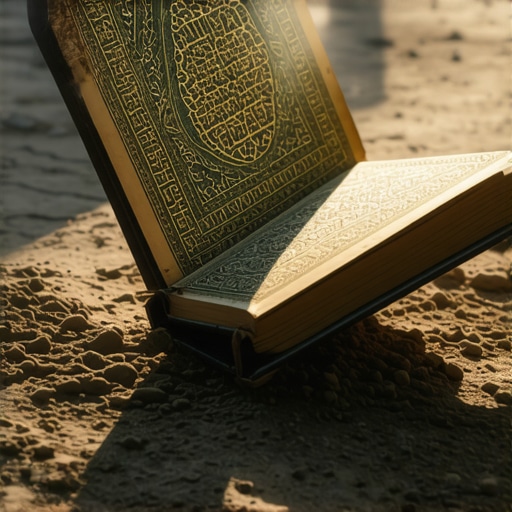My First Encounter with Dream Divination in Islam
It all started when I experienced a vivid dream that seemed to carry a message from the divine. As someone deeply interested in spirituality, I was curious about the concept of Oneiromancy in Islam and how dreams could be a conduit for divine guidance. This journey has not only deepened my faith but also opened my eyes to the sacred symbolism woven into our nightly visions.
Understanding the Sacred Art of Dream Interpretation
In my exploration, I learned that dream interpretation in Islam is a sacred science, rooted in tradition and prophetic teachings. The Prophet Muhammad (peace be upon him) emphasized the significance of dreams, considering them a form of divine communication. I discovered that many dreams are symbolic, representing spiritual messages that require careful analysis and understanding. For instance, dreaming of water can symbolize purity and divine guidance, while a snake might represent temptation or warnings, as detailed in dreams about snakes.
My Personal Insights into Dream Symbols and Divine Messages
One thing I found fascinating is how dreams can be a reflection of our inner spiritual state. I recall a night when I dreamt of a peaceful garden, which I later interpreted as a sign of spiritual tranquility and the blessings of Paradise, or Jannah. This interpretation aligns with what I read in the Islamic dream dictionary, emphasizing that dreams about gardens often symbolize divine blessings or divine promise. These symbols serve as reminders to strengthen our faith and seek closeness to Allah.
Why Do I Believe Dreams Hold Divine Messages?
From my perspective, dreams are a sacred gift, allowing us to glimpse the unseen realms and receive divine messages. In Islam, dreams can serve as warnings, glad tidings, or signs of future events. I remember reading in an authoritative source that dreams of Prophet Musa (Moses) might symbolize divine guidance and spiritual lessons (see here). Such insights make me appreciate the significance of being attentive to my dreams, especially when they feel profound or recurring.
What Should I Do When I Dream of Sacred Symbols?
My advice is to approach dreams with sincerity and seek knowledge from authentic sources. Praying upon waking, reflecting, and consulting knowledgeable scholars can help decode the messages. Also, keeping a dream journal can reveal patterns or recurring symbols that point toward divine guidance. If you’re interested in learning more about the sacred symbolism within dreams, I recommend exploring detailed Islamic dream dictionaries.
If you’ve ever experienced meaningful dreams, I invite you to share your stories in the comments below. Together, we can support each other in understanding the divine messages hidden within our dreams and deepen our faith.
Unveiling the Sacred Language of Dreams in Islamic Spirituality
Dreams have long been regarded as a divine channel in Islam, a sacred language through which Allah communicates with His servants. As an expert in Islamic dream interpretation, I have observed that understanding these symbols requires not only knowledge of prophetic traditions but also a nuanced appreciation of spiritual contexts. For example, dreaming of water often signifies purity and divine guidance, while encountering a snake might symbolize warning or temptation, as explained in dreams about snakes.
The Nuances of Dream Symbols: More Than Just Images
In Islamic tradition, symbols in dreams are layered with profound meanings that go beyond their superficial appearance. A dream of a garden, for instance, can symbolize the promise of paradise or spiritual tranquility, aligning with interpretations found in Islamic dream dictionaries. Such symbols serve as divine messages urging believers to strengthen their faith, seek forgiveness, or prepare for upcoming challenges. Recognizing these symbols requires a deep understanding of prophetic teachings and spiritual insights, which often involve contemplating the context of the dream and the dreamer’s current life circumstances.

How Do Sacred Symbols Reflect Our Inner Spiritual State?
Symbols in dreams serve as mirrors reflecting our inner spiritual health. For example, dreaming of a peaceful Jannah suggests inner serenity and closeness to Allah, emphasizing the importance of maintaining piety and gratitude. Conversely, dreams of darkness or chaos may indicate spiritual tests or warnings, prompting believers to seek divine protection through prayer and supplication. The significance of these symbols is rooted in Islamic teachings, such as those discussed in dreams about losing teeth, which often symbolize difficulties or divine mercy depending on the context.
Can Dreams Be Trusted as Divine Guidance? An Expert Perspective
From a scholarly perspective, not all dreams hold divine significance; discerning authentic divine messages requires spiritual discernment and adherence to Islamic principles. Genuine prophetic dreams often come with clarity, consistency, and alignment with Islamic teachings. It is advised to seek knowledge from trusted sources and scholars when interpreting dreams, especially those that evoke strong emotional or spiritual responses. For further insight, exploring authoritative Islamic dream dictionaries can be invaluable for understanding symbol meanings and their relevance to personal spiritual journeys.
What Are the Practical Steps to Interpret Sacred Symbols in Dreams?
Practicing proper dream interpretation involves a combination of sincerity, prayer, and consultation. Start by praying for guidance and clarity upon waking, then keep a detailed dream journal to track recurring symbols and themes. Reflection on personal circumstances and seeking counsel from knowledgeable scholars can further clarify the divine messages. Remember, the goal is to deepen faith and enhance spiritual growth, not merely to decode symbols superficially. If you wish to explore more about sacred symbols and their meanings, I recommend reviewing comprehensive resources like Ibn Sirin’s dream dictionary.
Exploring the Hidden Depths of Sacred Symbols in Dreams
As I continue my journey into the realm of Islamic dream interpretation, I often find myself contemplating the layered meanings that sacred symbols can embody. Dreams are not merely visual impressions but are like intricate tapestries woven with divine threads, inviting us to decode their profound messages. For example, a simple image of water can have multiple layers—symbolizing purity, divine guidance, or even spiritual renewal depending on the context and emotional tone of the dream. This complexity reminds me of the importance of not rushing to superficial interpretations but rather immersing ourselves in a reflective process that honors the sacred language of dreams.
How Do Personal Life Circumstances Influence Dream Symbols?
One of the most fascinating aspects I have encountered is how personal circumstances shape the meaning of symbols. A dream about a garden might universally signify paradise, but for someone going through a period of spiritual drought, it could symbolize hope and a promise of renewal. Conversely, for another facing difficulties, it might serve as a divine reminder to seek patience and reliance on Allah’s mercy. This nuanced perspective underscores the importance of contextual understanding in dream interpretation—an insight supported by scholars like Ibn Sirin, who emphasized the significance of the dreamer’s life situation in decoding messages. If you are curious about how personal circumstances interplay with divine messages, I recommend exploring Islamic dream dictionaries for deeper insights.
Can Sacred Symbols Evolve With Our Spiritual Growth?
Reflecting on my own experiences, I realize that the symbols I encounter in dreams can change in their significance as my spiritual journey unfolds. A symbol that once represented temptation may later become a sign of divine testing or a call for perseverance. This evolution highlights the dynamic nature of dream symbolism in Islam, where divine messages are not static but adapt to our spiritual maturity. It also emphasizes the need for ongoing reflection, prayer, and seeking knowledge to truly understand what Allah communicates through our dreams at different stages of life. Engaging with trusted scholars and Islamic resources, such as Ibn Al-Qayyim’s insights, can facilitate this deeper understanding.
How Can We Cultivate a Sacred Approach to Dream Interpretation?
To truly honor the sacred art of dream interpretation, I believe we must approach it with sincerity, humility, and a heartfelt desire for divine guidance. This involves prayer upon waking, asking Allah for clarity and wisdom, and maintaining a humble attitude that recognizes our limitations in understanding divine messages fully. Keeping a dream journal is a practical step—recording symbols, emotions, and circumstances can reveal patterns that point toward divine communication. Furthermore, engaging with authentic Islamic teachings and consulting knowledgeable scholars ensures that our interpretations remain aligned with prophetic traditions. If you wish to explore more about how to develop a sacred approach, I encourage you to review interpretations of dreams about losing teeth and other related resources.
Dreams are a sacred gift, offering us glimpses into the divine plan. As we deepen our understanding, we become more attuned to the divine language that Allah uses to communicate with His servants. I invite you to share your personal experiences with sacred symbols in dreams—every story enriches our collective journey towards spiritual enlightenment and divine closeness.
Unlocking the Layers of Sacred Dream Symbols in Islamic Spirituality
As I deepen my understanding of Islamic dream interpretation, I realize that each symbol carries a multifaceted meaning rooted in prophetic traditions and spiritual symbolism. Dreams are like sacred codes, with each image and gesture revealing insights that transcend the superficial. For example, dreaming of water often signifies divine guidance and spiritual purity, but its interpretation can vary depending on the emotional tone and context of the dream, demanding a nuanced understanding that aligns with prophetic teachings (see Islamic dream dictionary). This layered symbolism invites us to approach dreams with reverence and meticulous reflection, recognizing the divine language embedded within our subconscious.
How Do I Differentiate Between Genuine Divine Messages and Personal Impressions?
Distinguishing authentic divine guidance from personal impressions requires a combination of spiritual sensitivity, knowledge, and humility. Genuine prophetic dreams often come with clarity, emotional resonance, and consistency with Islamic teachings, whereas personal impressions may lack these qualities. Consulting trusted scholars and engaging in prayer upon waking can help clarify the divine origin of a dream. Additionally, studying authoritative sources such as Ibn Sirin’s dream dictionary can serve as a valuable compass in this discernment process. Recognizing the divine messages amidst the myriad symbols demands patience and ongoing spiritual vigilance, fostering a deeper connection with Allah’s guidance.
How Can Personal Life Circumstances Influence the Sacred Symbols in Our Dreams?
My personal experience has shown me that the context of our lives profoundly shapes the meaning of dream symbols. A peaceful garden, for instance, may universally symbolize paradise, but for someone experiencing spiritual drought, it might serve as a divine reminder of hope and renewal. Conversely, for those facing hardship, such dreams could be a sign of divine mercy and patience. This underscores the importance of considering one’s current life circumstances when interpreting dreams—an approach emphasized by scholars who advocate for contextual analysis in dream symbolism. For more insights on this, exploring dreams about pregnancy can shed light on how personal circumstances influence divine messages.
Can Sacred Symbols Evolve as My Spiritual Journey Progresses?
Absolutely. Throughout my spiritual journey, I’ve observed that symbols’ meanings adapt as I grow in faith. A symbol that once represented temptation may later signify divine testing or perseverance, reflecting my evolving understanding of divine messages. This dynamic nature of dream symbolism highlights the importance of ongoing reflection, prayer, and seeking knowledge from trusted sources such as Ibn Al-Qayyim’s insights. Embracing this evolution allows us to remain receptive to divine guidance tailored to each stage of our spiritual growth, reinforcing the importance of humility and continuous learning.
How Do I Cultivate a Sacred Approach to Dream Interpretation?
Developing a sacred approach involves sincerity, humility, and a heartfelt desire for divine guidance. I start by praying for clarity and wisdom upon waking, then diligently record my dreams in a journal to identify recurring symbols and themes. Reflecting on personal circumstances and consulting knowledgeable scholars helps deepen my understanding, ensuring interpretations align with prophetic teachings. Engaging with authentic Islamic resources, such as comprehensive dream dictionaries, further refines this sacred practice. Remember, the goal is to strengthen faith and foster spiritual growth, not merely to decode symbols superficially. Sharing personal experiences with dreams can foster collective spiritual insight and encouragement within our community of believers.
Dreams are a divine gift, woven with sacred messages that guide us closer to Allah. As I continue exploring their depths, I invite you to reflect on your own dream experiences, recognizing that each symbol is a thread in the divine tapestry that Allah Himself has woven for our spiritual journey. Embrace this sacred art with reverence, patience, and a sincere heart, and you will discover profound insights that elevate your faith and deepen your divine connection.
Things I Wish I Knew Earlier (or You Might Find Surprising)
The Hidden Layers of Dream Symbols
One thing I wish I had understood sooner is how layered and nuanced dream symbols can be in Islam. A simple image like water might seem straightforward, but it often carries multiple meanings—purity, divine guidance, or even spiritual renewal—depending on the context and emotional tone of the dream. This realization has deepened my appreciation for the sacred language of dreams and encouraged me to reflect more carefully before jumping to conclusions.
The Personal Context Matters More Than You Think
Initially, I believed that certain symbols always meant the same thing for everyone. However, I’ve come to see that personal life circumstances dramatically influence dream interpretations. For example, dreaming of a garden can symbolize paradise, but for someone in a spiritual drought, it might be a sign of hope and renewal. Recognizing this has made my understanding more compassionate and tailored, emphasizing the importance of context in Islamic dream analysis.
Not All Dreams Are Divinely Guided
It took me some time to realize that not every vivid dream is a divine message. Genuine prophetic dreams usually come with clarity and alignment with Islamic teachings, whereas other dreams might simply be reflections of our subconscious. Learning to discern between these has helped me approach dreams with humility and sincerity, seeking guidance through prayer and consultation with knowledgeable scholars.
The Evolution of Symbols with Spiritual Growth
As I continue my spiritual journey, I’ve noticed that the meaning of certain symbols evolves. A symbol that once represented temptation may later signify divine testing or perseverance. This dynamic aspect of dream symbolism reminds me to stay humble and open-minded, understanding that Allah speaks to us in ways that adapt as we grow closer to Him.
Practical Steps for Sacred Dream Interpretation
Over time, I’ve found that keeping a detailed dream journal and praying upon waking are invaluable. Reflecting on recurring symbols and seeking knowledge from trusted Islamic resources can help decode divine messages. These practices foster a sacred, humble approach to understanding dreams, turning them into tools for spiritual growth rather than mere curiosities.
Resources I’ve Come to Trust Over Time
- Islamic Dream Dictionary — This comprehensive guide has been instrumental in helping me understand the symbolism in my dreams. Its detailed entries and prophetic insights make it a trustworthy resource I often recommend to friends.
- Ibn Sirin’s Dream Interpretation — A classic and authoritative source, this book has deepened my understanding of dream symbolism in Islam, emphasizing the importance of context and personal circumstances.
- Islamic Scholar Consultations — Engaging with knowledgeable scholars has been invaluable. Their guidance helps me interpret dreams with sincerity and alignment to Islamic teachings.
Parting Thoughts from My Perspective
Dreams in Islam are a profound gift, rich with divine messages that require careful reflection and sincere intention. The more I learn about the sacred symbolism woven into our nightly visions, the more I appreciate how Allah communicates with us through these subtle signs. If this resonates with you, I encourage you to approach dreams with humility and curiosity, seeking knowledge and divine guidance along the way. Feel free to share your own experiences or reflections—I believe our collective insights can help us all deepen our faith and understanding of Allah’s sacred messages.



Reading this post really deepened my appreciation for the sacred science of dream interpretation in Islam. I once had a vivid dream about water, and at first, I thought it was just a coincidence, but after reading about its symbolism here, I realize there’s a lot more to understand. I’ve always believed dreams hold messages, but I’ve struggled with how to approach interpreting them practically. The advice on keeping a dream journal and praying for guidance resonated with me because I think consistent reflection can unlock a lot of spiritual insights that we might overlook. I wonder, how do others distinguish between dreams that are simply subconscious reflections and those that are divine messages? Have you found specific practices or signs helpful in making that distinction? It seems important to remain humble and sincere when seeking this knowledge, especially since we’re dealing with Allah’s sacred communication. I look forward to hearing more shared experiences, as they surely can enrich our collective understanding and faith.
This post beautifully emphasizes the sacred nature of dreams in Islam and how they can serve as divine messages. I personally experienced a recurring dream about a serene Garden, which I initially dismissed as mere imagination. However, after reading this, I realize that such symbols might point to spiritual needs or divine reminders. It’s inspiring to see how dream interpretation in Islam integrates prophetic teachings with personal reflection. I’ve found that maintaining a dream journal has helped me identify patterns over time, which seems to be a practical way to explore these divine messages more deeply. Do you think that certain dreams are more likely to be authentic divine guidance, or is every dream equally significant? I’d love to hear others’ experiences on how they differentiate between subconscious thoughts and divine messages, especially in light of Islamic teachings. It’s truly a humbling experience to think that Allah communicates with us in subtle yet profound ways through dreams. This encourages me to be more attentive and sincere in my spiritual journey.